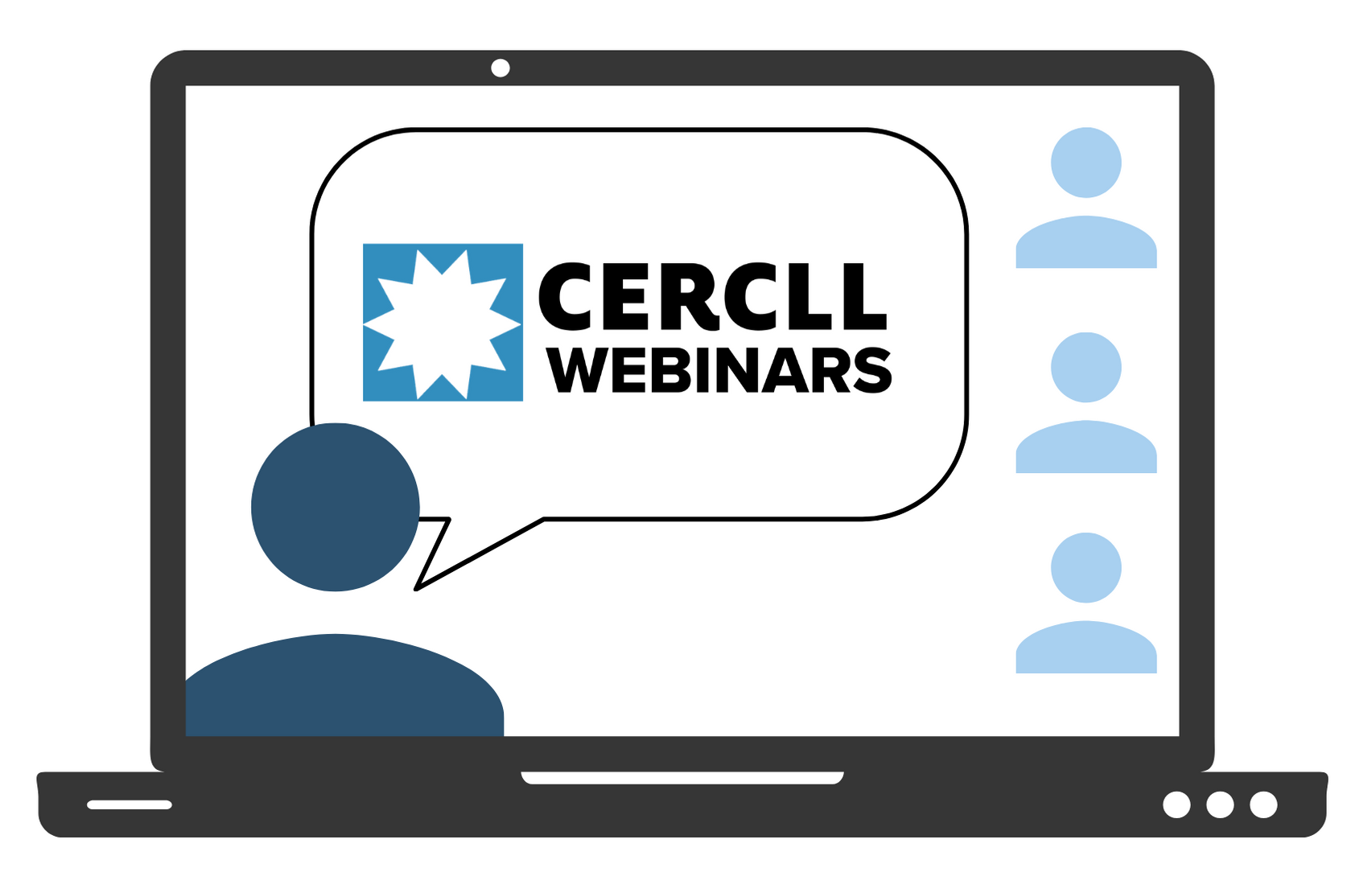
Each year, CERCLL hosts one or more series of professional learning webinars for language educators, with topics selected from among requests that we have received from participants in our previous professional development events. This Spring, the series focuses on AI integration in the language classroom:
Rebooting Language Educ-AI-tion
In recent years, cutting edge tech tools such as neural machine translation (NMT), generative AI and extended reality (XR) have given rise to a mixture of excitement and concern as to their potential uses. In this webinar series, the opportunities and challenges these tools present will be explored and the pedagogies they require examined for the purpose of rebooting language teaching and learning.
The webinars are free to attend, but participants must register in advance. Participants who attend these events live can request a certificate of attendance for 1.5 hours of continuing education for each webinar they attend. In addition, live attendees will be contacted after each webinar with information about how to apply for a digital badge.
Integrating Online Translators and other AI Tools in Language Instruction
Webinar presented by Errol M. O’Neill (University of Memphis)
Wednesday, January 31, 2024, 10-11:30 AM Arizona (UTC-7)
To see when it begins where you are, visit: https://tinyurl.com/yh9vf8kt
Abstract:
Instructional technologies have revolutionized the way students learn and educators teach world languages. Online machine translators and Generative AI – two types of artificial intelligence tools that are available to the general public – represent both an exciting opportunity and a potential risk for language instruction.
This webinar will take a three-pronged approach to the issue of AI integration in the context of world language courses. First, research related to the use of online translators and AI chatbots and their effects on language learning will be reviewed. The literature on these tools shows a number of beneficial impacts on learners’ written and oral production, as well as their confidence in using the target language. Next, specific policies and activity types will be explored that allow for responsible use of these and related technologies. Examples will be presented of online translator and AI policies that have been adopted at a variety of K-12 and higher ed institutions, as well as tasks that instructors have reported using that encourage appropriate and thoughtful use of these tools. Finally, participants will have the opportunity to collaborate with other attendees to construct an activity incorporating online translator and AI chatbot usage that reflects their own priorities and the needs of their learners.
By the end of this session, attendees will be better informed about the current state of affairs and future directions for online translation and generative AI in language instruction. In addition, they will gain practical, hands-on experience in creating tasks integrating online translators and generative AI that can be applied to their own instructional context.
➣Visit the event page
Biography
Dr. Errol M. O’Neill (he/him) is an Associate Professor at the University of Memphis (USA). He is Supervisor of French Graduate Teaching Assistants and course designer and developer of the four-course online basic language sequence of French on U of M Global, the University of Memphis’s online degree program. He earned his Ph.D. at the University of Illinois Urbana-Champaign in French SLATE (Second Language Acquisition and Teacher Education). His research explores the intersection of technology and language learning, in particular student use of electronic tools, including online machine translators, online dictionaries, and more recently, AI chatbots. He has given nearly 40 conference presentations, webinars, workshops, and invited talks on the topics of online machine translation, generative AI, and the integration of technology in language instruction. His forthcoming chapter in the Routledge Handbook of Research in World Language Instruction (expected publication summer 2024) explores the topics of academic integrity and digital literacy among language learners.
Generative AI in Language Education: Rewards, Risks, and Reboots
Wednesday, March 13, 2024, 10-11:30 AM Arizona (UTC-7)
This event begins at 10 am Pacific / 1pm Eastern
To see the start time where you are, visit: https://tinyurl.com/nhjz55fk
Webinar presented by Ilka Kostka (Northeastern University)
Abstract:
Advancements in generative artificial intelligence (AI) have garnered tremendous attention across disciplines and industries, and language education is no exception. At present, we are teaching, learning, and working in a world that is being increasingly impacted by generative AI on an almost daily basis. One of the most popular applications, ChatGPT, was made available to the public in November 2022, sparking both excitement and fear about responsible use, academic integrity, and data privacy (Tlili et al., 2023). In turn, a growing body of scholarship has explored the use of ChatGPT and other generative AI applications to support language instruction (Kohnke et al., 2023; Kostka & Toncelli, 2023), inform in-class activities (Warner, 2023), and build students’ 21st-century skills (Hié, 2023). Despite the mixed feelings that many educators have about generative AI, few can deny that these programs have tremendous implications for both English and world language instruction.
The primary goal of this webinar is to collectively explore and critically examine the role of generative AI in language education. We begin with a brief overview of key concepts related to generative AI before examining the benefits and rewards it may offer language educators. We then discuss the risks inherent to generative AI adoption, as well as the ethical considerations that instructors should know to both teach their students about AI and use it in their own work. Finally, we consider how language education may be “rebooted” for pedagogical innovation and address pressing questions that will impact the field moving forward. During the webinar, I will provide examples from my classes to show how I have used generative AI in both teacher-facing and student-facing ways and share preliminary findings from classroom-based research projects conducted over the past academic year. This webinar is geared toward all language educators with a range of knowledge and experience using generative AI; technical expertise is not required.
➣Visit the event page
Biography
Dr. Ilka Kostka is a teaching professor at Northeastern University in Boston, Massachusetts. She teaches English language courses to undergraduate and graduate international students, develops and evaluates language programs, manages graduate courses, and supports instructors. She received her PhD in bilingual education from New York University, where she examined ways of teaching source-based academic writing to multilingual learners. Dr. Kostka’s current scholarly activities focus primarily on approaches that support English language learning, such as the flipped learning model and computer-assisted language learning. Over the past year, she has been incorporating generative artificial intelligence (AI) into her work by experimenting with varying tools, planning workshops for faculty, and conducting research with colleagues. Before teaching English as a Second Language, Dr. Kostka was a German language instructor at universities in Connecticut and New York City. She has also taught English in China and lived and studied in Germany. She is the current Secretary of Northern New England TESOL (NNETESOL) and serves on the Board of Directors of Literacy Volunteers of Greater Worcester, which provides literacy and language instruction to immigrants and refugees in central Massachusetts.
Integrating Extended Reality in Language Instruction
Thursday April 18, 2024,10-11:30 AM Arizona (UTC-7)
To see the time of this event where you are, visit: https://tinyurl.com/ycx26m2z.
Webinar presented by Regina Kaplan-Rakowski, (University of North Texas)
Abstract:
➣Visit the event page
Biography
Regina Kaplan-Rakowski is an Assistant Professor of Learning Technologies at the University of North Texas (UNT). She also serves as Vice President of the Computer-Assisted Language Instruction Consortium (CALICO). Dr Kaplan-Rakowski’s key research interests are at the intersection of three areas: immersive learning technologies (e.g., virtual reality, augmented reality, mixed reality), emotional responses to learning technologies (e.g., immersion, anxiety, engagement), and computer-assisted language learning (CALL). Within CALL, Dr Kaplan-Rakowski studies how practicing various language skills can be facilitated using high-immersion virtual reality, immersive stereoscopic 3D pictures, 360-degree pictures, and other immersive technologies. She serves on the Editorial Board of Educational Technology & Society (ET&S) and the Journal of Technology and Teacher Education (JTATE).
Access our YouTube playlist for recordings from previous professional learning webinars, or visit individual event pages to see recordings and other resources shared by the presenters at those events.




